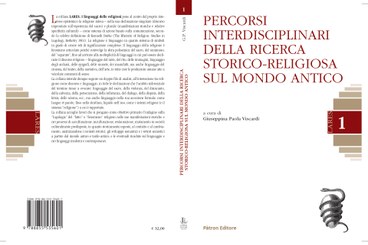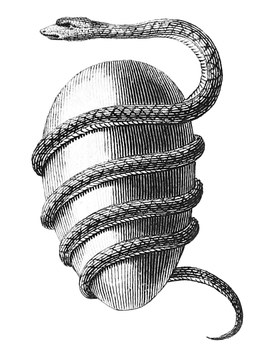
EDITORIAL SERIES LARES
LARES - I Linguaggi delle religioni. Collana di Studi sulle Religioni dell’Antichità e della Tarda Antichità. Strumenti, Storia, Tradizioni (Pàtron Editore, Bologna)

"Ophis et ovum mundanum Tyriorum". Snake and world egg of the inhabitants of Tyre. 1774. Bryant, Jacob, 1715–1804. A new system, or, An analysis of ancient mythology. vol II plate IV. James Basire, 1730–1802 (engraver)
The Series LARES - Languages of ReligionS places religion at the center of its epistemic interest - in its singular (discourse based on the experience of the sacred) and plural (historical manifestations and related cultural specificities) declination - as a system of action based on communication, according to the famous definition by Kenneth Burke (The Rhetoric of Religion. Studies in Logology, Berkeley 1970). Religion is language as a system of symbols capable of creating complex networks of meaning. The language of religion is a complex phenomenon because it involves the polysemic sphere of the sacred, the numinous, the "separated", up to the multiplicity of languages in which religious discourse can be declined - language of myth, ritual, images, language archaia, epigraphs, coins, artifacts, but also the language of cinema, theater, fiction, art, that is, in all human productions capable of conveying meaningful contents.
The series therefore intends to follow a double thread of analysis, at the intersection between religion as discourse and language, in all the declinations that the inferential sphere of the term manages to evoke: language of the sacred, of violence, of disenchantment, of salvation, of persecution, tolerance, dialogue, dispute, krisis, schism, etc., but also language in its formal meaning, such as 'langue' and 'parole', fixed in structure, pliable in use, like religious systems (and the "religion" system) to which it is related. The series includes works that have as their primary objective the investigation of the "logology" of the religious "fact" or "phenomenon" in its historical manifestations and in the processes of acculturation, inculturation, restoration, change in culturally predisposed societies, as historically exposed , to contact and change, analyzing their rhetorical contexts, semantic developments and semiotic vectors starting from the ancient and late-ancient world, and any repercussions on language and in modern and contemporary languages. The proposed works will be subjected to double-blind peer review by anonymous referees chosen from university professors and / or external experts. * The LARES Series takes up more widely the topic of the LARES Project and declines it further. ** All published works will be open access
Editor: Giuseppina Paola Viscardi (Alma Mater Studiorum - Università di Bologna)
Scientific committee: Sergio Botta (La Sapienza Università di Roma), Jan N. Bremmer (University of Groningen); Claude Calame (École des Hautes Études en Sciences Sociales), Giorgio Camassa (Università degli Studi di Udine), Laura Carnevale (Università degli Studi di Bari “Aldo Moro”), Sabina Crippa (Università Ca’ Foscari Venezia), Cristiana Facchini (Alma Mater Studiorum – Università di Bologna), Fabrizio Ferrari (Università degli Studi di Padova), Armin W. Geertz (Aarhus Universitet), Stella Georgoudi (École Pratique des Hautes Études), Tommaso Gnoli (Alma Mater Studiorum – Università di Bologna), Miguel Herrero de Jáuregui (Universidad Complutense de Madrid), Ana Isabel Jiménez San Cristobal (Universidad Complutense de Madrid), Mika Ilmari Kajava (Helsingin Yliopisto – University of Helsinki), Camillo Neri (Alma Mater Studiorum – Università di Bologna), Alessandro Saggioro (La Sapienza Università di Roma), Claudia Santi (Università degli Studi della Campania “Luigi Vanvitelli”), William Michael Short (University of Exeter), Natale Spineto (Università degli Studi di Torino), Chiara O. Tommasi (Università degli Studi di Pisa), Lech Trzcionkowski (Uniwersytet Jagiellonski w Krakowie – Jagiellonian University in Kraków)
Editorial Board: Giulio Leghissa (University of Toronto), Gaetano Spampinato (Université de Fribourg)